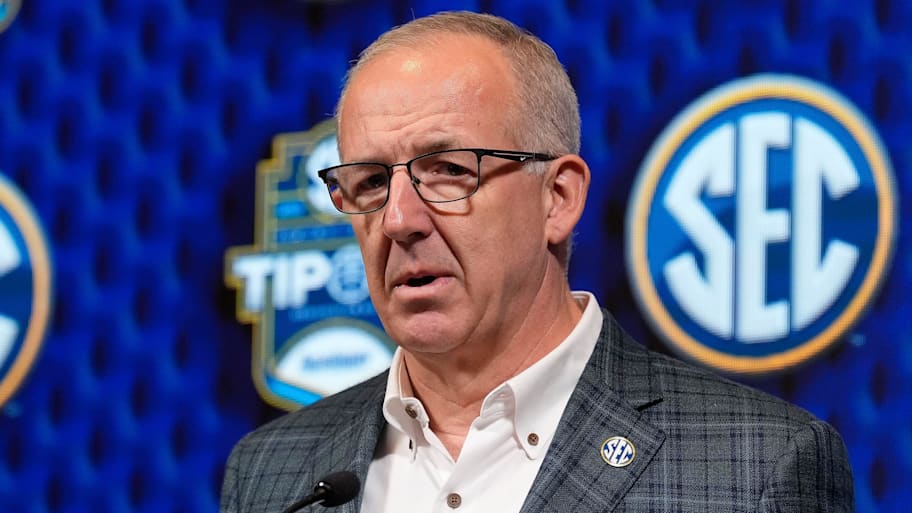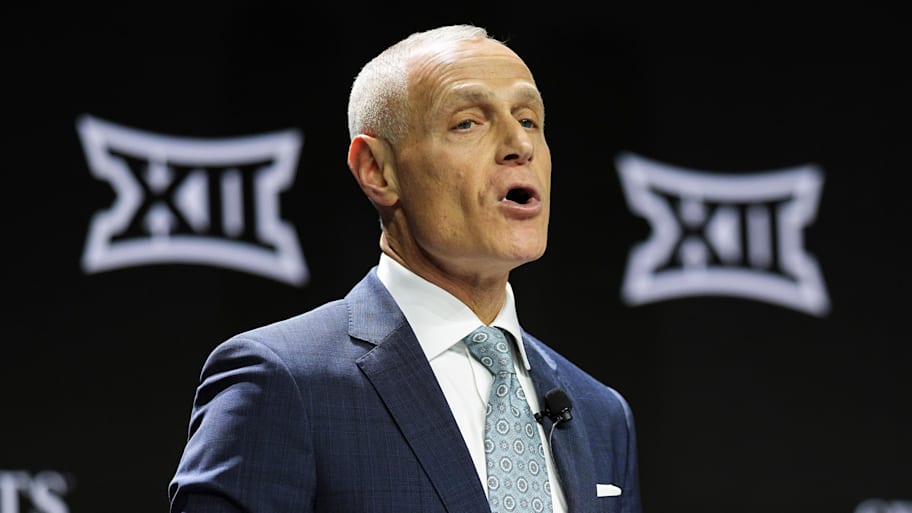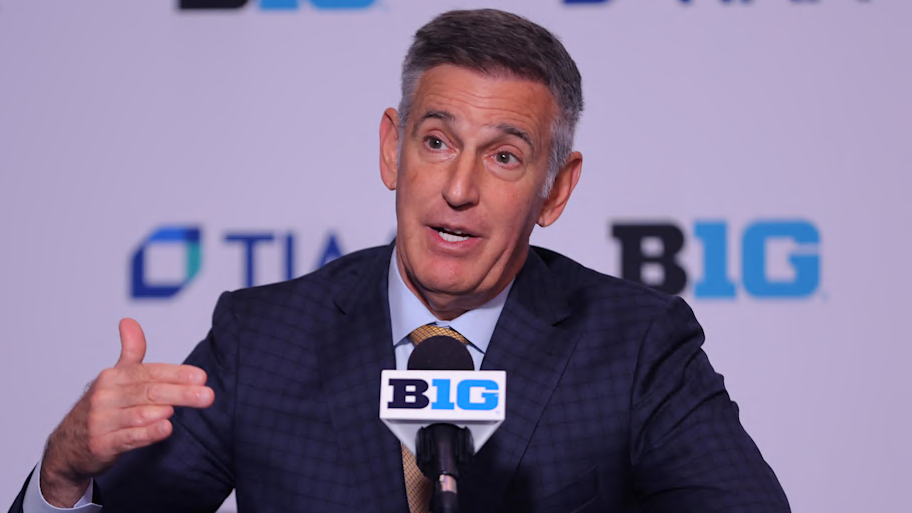
MIRAMAR BEACH, Fla. — Southeastern Conference commissioner Greg Sankey doesn’t always say what he thinks, but he rarely hides how he feels. Monday afternoon he kicked off SEC spring meetings here by launching a feelings rocket at other commissioners and critics. Sankey made it clear that he’s ticked off at the Big 12 and ACC, and also defensive about being portrayed as an enemy of the greater good of college football.
“I don't lecture others about good of the game and coordinating press releases about good of the game, okay,” Sankey said. “You can issue your press statement, but I'm actually looking for ideas to move us forward.”
Let’s unpack the motivation behind that pithy blast.
Start with some context: the tussle to shape the future of college sports is entering an even more acute phase. Legal forces in the form of a looming settlement in the House vs. NCAA case are reworking the economics of the industry. NCAA governance forces are further separating the haves from the have-nots. Rules are being rewritten, with vague hopes that they’ll be enforceable (not by the NCAA). And the crossfire between conferences has heated up again.
Enter Sankey, with a direct shot at Big 12 commissioner Brett Yormark and ACC commish Jim Phillips regarding their near-identical statements last week when the College Football Playoff adopted a straight-seeding model for 2025. It replaces a format that granted first-round byes to the four highest-ranked conference champions—a setup that granted Big 12 champ Arizona State a bye last season and could have done the same for the ACC champion (Clemson), if it had ranked higher. Phillips and Yormark joined with the rest of the FBS commissioners, and Notre Dame, in a unanimous vote to change a problematic but advantageous rule.
If straight seeding had been in effect last year, the SEC and Big Ten each would have had two of the top four spots and first-round byes. Instead, they had one apiece. So the ACC and Big 12 gave away something that stands to benefit the Big Ten and/or SEC.
"Today's decision was done in the best interest of the sport,” Phillips said Thursday. “It may not always benefit the ACC, but it was the right decision and that's a responsibility I take very seriously.”
"Today’s decision might not be the best thing for the Big 12, but it was the best thing for college football,” Yormark said the same day. “I hope what’s best for college football continues to be the priority in any discussions moving forward.”
Clark Williams of the Big 12 posted on X Monday night that they statements were not coordinated.

Intentionally or not, those comments pointed a finger at Sankey and Big Ten commissioner Tony Petitti. They have partnered in a strongman playoff power play that is indeed—despite Sankey’s protestations—not in the best interest of the sport, flexing their enhanced control over how the football postseason plays out.
The primary sticking point is the push toward a certain number of automatic bids for each of the four power conferences that could be written into the rules for seven seasons, from 2026-2032. The plan that the two strongmen reportedly prefer is a 16-team format that calls for four automatic bids each for the Big Ten and SEC, with two apiece for the Big 12 and ACC. The top-ranked champion from the non-power conferences would also get an automatic bid, with three at-large selections.
And here’s the kicker to this overhaul of a system that has been allowed to play out a grand total of one time: the Big Ten and SEC reportedly have authority to make decisions about the future playoff structure, provided they have “meaningful consultation” with other conferences and television partner ESPN. They can do what they want, more or less, and what they want to do is stack the deck in their favor.
They don’t have to do it, of course. The two conferences already have more top programs than everyone else, having combined to win the past six national championships (four by the SEC, two by the Big Ten). They’ll almost assuredly get at least four teams in every season in a 16-team playoff. But those should still be earned on the field, not pre-ordained before a season even begins.
The two leagues already have the most money, the richest media deals, the most fans and the deepest tradition. They don’t need any additional advantages without earning them on the field. But these SEC meetings this week could echo the Big Ten gathering last week that produced support for the so-called 4-4-2-2-1 model of automatic playoff bids.

This is one of the reasons why Petitti and Sankey are considered an enemy of the majority of the 136 schools at the FBS level. Petitti, who has a network TV background, doesn’t seem too terribly concerned with that label. For Sankey, a lifelong college administrator who has rolled up his sleeves and done the tedious and occasionally controversial work on a multitude of committees, that probably stings.
“I think I have a responsibility to push, and I think my [SEC] membership has a responsibility and a desire to push me,” Sankey said Monday. “And that is a hard issue if you want to go inside what it's like to sit in this role. I think about the responsibility I have here [to the league] and I think about the responsibility more broadly all the time.
“We'll continue to try to provide perspective and information to our members and help them guide the decision. And ultimately, I recognize I'm the one who ends up typically in front of podium explaining not just myself but ourselves. So good luck to me.”
But if the criticism stings, it must also be said that sometimes the truth hurts.
The predatory movements by the SEC and Big Ten to add schools in recent years, destabilizing the Big 12 and killing the Pac-12, were good for those leagues but bad for the general well-being of college sports. And with those acquisitions have come more money and more power, and more opportunity to further press the advantage.
While it feels like Petitti and Sankey are brazenly playing catch with a priceless Chinese vase, opposing forces are trying to keep them from breaking the thing. U.S. Representative Brendan Boyle (D-Pa.) fired a social-media shot across the bow after hearing some of Sankey’s stances Monday: "Let me state this as clearly as I can: the Big Ten and SEC should be very, very careful about some of the decisions they are about to make. Because they appear hellbent on ruining major college football. I think they need congressional hearings into their collusion.”
Given how desperately college sports leaders have been courting Congress for help in the form of an antitrust exemption that would prevent an employee-employer relationship with athletes—which could bankrupt many programs—threats from Capitol Hill should be taken seriously. Alums of schools in the ACC, Big 12, Notre Dame and other conferences are not hard to find in Congress, and they could mobilize against the Big Ten-SEC axis.
But in the meantime, Petitti and Sankey continue to play catch with the vase. Everyone else can only hold their breath and hope they don’t drop it.
This article was originally published on www.si.com as SEC’s Sankey Wants to Reshape College Sports Without the Bad-Guy Blowback.







